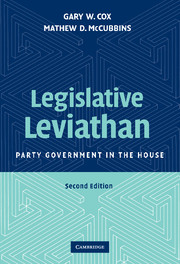Book contents
- Frontmatter
- Contents
- List of Figures
- List of Tables
- Acknowledgments
- Legislative Leviathan
- Introduction
- PART ONE THE AUTONOMY AND DISTINCTIVENESS OF COMMITTEES
- PART TWO A THEORY OF ORGANIZATION
- 4 Institutions as Solutions to Collective Dilemmas
- 5 A Theory of Legislative Parties
- PART THREE PARTIES AS FLOOR-VOTING COALITIONS
- PART FOUR PARTIES AS PROCEDURAL COALITIONS
- PART FIVE PARTIES AS PROCEDURAL COALITIONS
- Conclusion
- Appendix 1 Uncompensated Seniority Violations, Eightieth through Hundredth Congresses
- Appendix 2 A Model of the Speaker's Scheduling Preferences
- Appendix 3 Unchallengeable and Challengeable Vetoes
- Appendix 4 The Scheduling Power
- Bibliography
- Author Index
- Subject Index
4 - Institutions as Solutions to Collective Dilemmas
Published online by Cambridge University Press: 05 June 2012
- Frontmatter
- Contents
- List of Figures
- List of Tables
- Acknowledgments
- Legislative Leviathan
- Introduction
- PART ONE THE AUTONOMY AND DISTINCTIVENESS OF COMMITTEES
- PART TWO A THEORY OF ORGANIZATION
- 4 Institutions as Solutions to Collective Dilemmas
- 5 A Theory of Legislative Parties
- PART THREE PARTIES AS FLOOR-VOTING COALITIONS
- PART FOUR PARTIES AS PROCEDURAL COALITIONS
- PART FIVE PARTIES AS PROCEDURAL COALITIONS
- Conclusion
- Appendix 1 Uncompensated Seniority Violations, Eightieth through Hundredth Congresses
- Appendix 2 A Model of the Speaker's Scheduling Preferences
- Appendix 3 Unchallengeable and Challengeable Vetoes
- Appendix 4 The Scheduling Power
- Bibliography
- Author Index
- Subject Index
Summary
Starting with this and the next chapter, we begin to articulate a view of parties as legislative cartels. This metaphor seems apt to us in part because both cartels and parties – indeed organizations in general – face a variety of collective dilemmas that must be solved if the organization is to operate effectively. This chapter accordingly deals with the general topic of organizational design and structure. The next chapter then focuses more specifically on legislative parties.
Social scientists from a variety of disciplines study institutions such as legislatures, business firms, public and private bureaucracies, armies, and trade associations. This chapter reviews what we consider to be the most satisfying and comprehensive theory of institutional origins and design: what we shall refer to as the neo-institutional or neocontractarian theory. This theory, exposited fully in no single source, appears in remarkably similar form in a variety of fields. It will be familiar to normative political theorists as a generalized version of the Hobbesian theory of the state, to positive political theorists as a variant on the idea of a “political entrepreneur,” and to industrial organization economists as an elaboration on the Alchian/Demsetz theory of the firm. Our purpose here is to underscore the similarity of these various theories – all of which seek to explain institutional features in terms of the choices made by rational individuals facing collective dilemmas – and to examine the answers given to two key questions: How do institutions “solve” collective dilemmas?
- Type
- Chapter
- Information
- Legislative LeviathanParty Government in the House, pp. 79 - 98Publisher: Cambridge University PressPrint publication year: 2007



